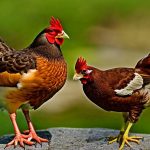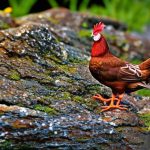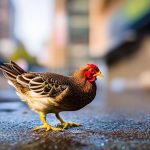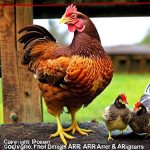Keeping Aylesbury ducks and chickens together can be a rewarding experience for poultry enthusiasts. Aylesbury ducks are characterized by their white plumage and are valued for their meat and egg production. They have a calm and friendly temperament, making them suitable for backyard flocks.
Chickens are popular for their eggs, meat, and ability to control pests. When raised together, Aylesbury ducks and chickens can complement each other in foraging, pest control, and social interaction. However, there are important considerations when keeping these species together, including housing, feeding, health care, and managing their behavior and interactions.
Aylesbury ducks and chickens have distinct housing and accommodation requirements due to their different needs and behaviors. Ducks require access to water for swimming and bathing, while chickens do not need water for these activities. Separate areas for roosting and nesting are necessary, as ducks prefer ground-level nests, while chickens favor elevated nesting boxes.
Ducks generally need more space than chickens, so housing should be sufficiently spacious to accommodate both species comfortably. Adequate ventilation and protection from predators are essential for both ducks and chickens. A well-designed and spacious coop that meets the needs of both Aylesbury ducks and chickens is crucial for successful cohabitation.
Table of Contents
- 1 Housing and Accommodation for Aylesbury Ducks and Chickens
- 2 Feeding and Nutrition for Aylesbury Ducks and Chickens
- 3 Health and Care for Aylesbury Ducks and Chickens
- 4 Managing Behavior and Interactions between Aylesbury Ducks and Chickens
- 5 Benefits of Keeping Aylesbury Ducks and Chickens Together
- 6 FAQs
- 6.1 What are Aylesbury ducks?
- 6.2 Can Aylesbury ducks be kept with chickens?
- 6.3 What are the benefits of keeping Aylesbury ducks with chickens?
- 6.4 Are there any considerations when keeping Aylesbury ducks with chickens?
- 6.5 Do Aylesbury ducks and chickens require different care?
- 6.6 What should be considered when introducing Aylesbury ducks to a chicken flock?
Key Takeaways
- Aylesbury ducks and chickens can be successfully kept together, but it requires careful planning and consideration of their specific needs and behaviors.
- Providing separate housing and accommodation for ducks and chickens is essential to ensure their safety and well-being.
- A balanced diet that includes appropriate nutrients and access to clean water is crucial for the health and productivity of both ducks and chickens.
- Regular health checks, parasite control, and appropriate shelter are important aspects of caring for Aylesbury ducks and chickens.
- Understanding the natural behaviors and social dynamics of ducks and chickens can help in managing their interactions and ensuring a harmonious cohabitation.
Housing and Accommodation for Aylesbury Ducks and Chickens
Meeting the Needs of Both Species
Ducks require access to water for swimming and bathing, while chickens do not have the same need for water activities. Therefore, it is essential to provide a separate area for ducks to access water, such as a small pond or kiddie pool, while ensuring that chickens do not have access to it. Additionally, ducks need more space to move around compared to chickens, so the housing should be spacious enough to accommodate both species comfortably.
Coop Design and Ventilation
Providing separate nesting areas for ducks and chickens is also crucial, as ducks prefer to nest on the ground, while chickens prefer elevated nesting boxes. It is important to provide adequate ventilation and protection from predators for both ducks and chickens. Overall, a well-designed coop that meets the needs of both Aylesbury ducks and chickens is essential for successful cohabitation.
Outdoor Run Design
In addition to the coop, providing a secure outdoor run is important for both Aylesbury ducks and chickens. The run should be large enough to allow both species to forage and exercise while keeping them safe from predators. It is also important to provide shelter within the run to protect them from the elements. When designing the outdoor run, it is important to consider the natural behaviors of both ducks and chickens. Ducks enjoy foraging in wet areas, so providing a muddy area or shallow pool within the run can keep them entertained and satisfied. Chickens, on the other hand, enjoy scratching and dust bathing, so providing a dry area with loose soil or sand can fulfill their natural behaviors.
Feeding and Nutrition for Aylesbury Ducks and Chickens

Feeding Aylesbury ducks and chickens together requires careful consideration of their dietary needs and preferences. Ducks are omnivores and have a higher requirement for protein compared to chickens. They also require more niacin in their diet to prevent leg problems.
Therefore, it is important to provide a balanced diet that meets the nutritional requirements of both species. A commercial poultry feed formulated specifically for ducks and chickens can be used as the base of their diet. However, it is important to supplement their diet with fresh fruits, vegetables, and greens to provide additional nutrients and enrichment.
Additionally, ducks require access to water while eating, as they use water to help swallow their food. Therefore, providing a shallow dish of water while feeding ducks is essential. When feeding Aylesbury ducks and chickens together, it is important to monitor their food intake to ensure that each species is getting the appropriate amount of food.
Ducks tend to be messy eaters and may waste more food compared to chickens. Therefore, it is important to provide feeders that are suitable for both ducks and chickens to minimize waste. Additionally, it is important to provide grit for both ducks and chickens to aid in digestion.
Grit helps birds grind their food in their gizzards since they do not have teeth. Overall, providing a balanced diet that meets the nutritional needs of both Aylesbury ducks and chickens is essential for their health and well-being.
Health and Care for Aylesbury Ducks and Chickens
Maintaining the health and well-being of Aylesbury ducks and chickens requires regular care and monitoring. Both species are susceptible to various diseases and parasites that can affect their overall health. Therefore, it is important to provide regular health checks and preventive care for both ducks and chickens.
This includes monitoring their overall condition, checking for signs of illness or injury, and providing appropriate veterinary care when needed. When keeping Aylesbury ducks and chickens together, it is important to be aware of the specific health needs of each species. Ducks are more susceptible to certain diseases such as botulism and duck viral enteritis, while chickens are more prone to diseases such as coccidiosis and infectious bronchitis.
Therefore, it is important to be familiar with the common health issues that affect both ducks and chickens in order to provide appropriate preventive care. Additionally, providing a clean living environment with good ventilation, proper sanitation, and regular cleaning of feeders and waterers can help prevent the spread of diseases among Aylesbury ducks and chickens. In addition to regular health checks, it is important to provide appropriate grooming and maintenance for both Aylesbury ducks and chickens.
This includes trimming the nails of ducks and chickens as needed, checking for signs of mites or lice, and providing regular baths or dust baths as needed. Providing appropriate grooming and maintenance can help prevent health issues and ensure the overall well-being of both species.
Managing Behavior and Interactions between Aylesbury Ducks and Chickens
Managing the behavior and interactions between Aylesbury ducks and chickens is essential for maintaining a harmonious flock. Both species have different social structures and communication methods, so it is important to understand their natural behaviors in order to manage their interactions effectively. Ducks are generally more social than chickens and may form strong bonds with each other.
They also communicate through vocalizations and body language. Chickens, on the other hand, have a more structured social hierarchy within their flock and communicate through vocalizations, body language, and pecking order. When managing the behavior of Aylesbury ducks and chickens together, it is important to provide adequate space for both species to move around freely without feeling crowded or stressed.
Ducks require more space compared to chickens due to their larger size and need for water activities. Providing multiple feeding stations can also help minimize competition between ducks and chickens during feeding time. Additionally, providing enrichment such as toys or treats can help keep both species entertained and reduce boredom-related behaviors.
It is also important to monitor the interactions between Aylesbury ducks and chickens to ensure that there is no aggression or bullying within the flock. Ducks may exhibit mating behaviors towards chickens, which can lead to injury or stress for the chickens. Therefore, it is important to provide separate areas for nesting and roosting to minimize potential conflicts between ducks and chickens.
Overall, understanding the natural behaviors of Aylesbury ducks and chickens can help manage their interactions effectively and maintain a peaceful cohabitation.
Benefits of Keeping Aylesbury Ducks and Chickens Together

Pest Control Benefits
Aylesbury ducks and chickens can be a great team when it comes to pest control. Ducks are known for their ability to consume insects, slugs, snails, and other pests that can harm gardens or crops. Chickens also have similar pest control abilities, feeding on insects like beetles, caterpillars, grasshoppers, and ticks. When kept together, they can complement each other in keeping the insect population under control.
In addition to pest control, keeping Aylesbury ducks and chickens together can also offer social benefits for both species. Ducks are known for their calm and friendly nature, while chickens are social animals that thrive in a flock environment. When kept together, they can form strong bonds with each other and provide companionship within the flock, reducing stress and boredom-related behaviors in both species.
Practical Benefits
Keeping Aylesbury ducks and chickens together can also offer practical benefits for poultry enthusiasts. Ducks are known for their high egg production during the spring and summer months, while chickens tend to lay eggs consistently throughout the year. When kept together, they can provide a diverse supply of eggs throughout the year, offering a steady source of fresh eggs for consumption or sale. Overall, keeping Aylesbury ducks and chickens together can offer several benefits, including pest control, social companionship, and a diverse supply of eggs throughout the year.
In conclusion, keeping Aylesbury ducks and chickens together can be a rewarding experience for poultry enthusiasts when done with careful consideration of their unique needs and behaviors. Providing appropriate housing that meets the needs of both species is essential for successful cohabitation. Additionally, providing a balanced diet that meets the nutritional requirements of both Aylesbury ducks and chickens is crucial for their health and well-being.
Regular health checks, preventive care, grooming, maintenance, managing behavior, interactions between Aylesbury ducks and chickens are also essential aspects of maintaining a harmonious flock. Overall, keeping Aylesbury ducks and chickens together can offer several benefits including pest control abilities, social companionship within the flock, diverse egg production throughout the year. Tips for successful cohabitation of Aylesbury ducks with chickens include providing adequate space for both species, monitoring their interactions closely, providing enrichment activities such as toys or treats.
By following these tips and considerations carefully, poultry enthusiasts can enjoy a harmonious cohabitation between Aylesbury ducks and chickens while reaping the benefits of pest control abilities, social companionship within the flock, diverse egg production throughout the year.
If you’re considering keeping Aylesbury ducks with chickens, you may also be interested in learning about the best chicken coops for your flock. Poultry Wizard offers a helpful article on the Snaplock Chicken Coop, which provides a secure and comfortable environment for your chickens. Check it out here.
FAQs
What are Aylesbury ducks?
Aylesbury ducks are a breed of domestic duck known for their white plumage and orange bill. They are popular for their meat and are also kept for their eggs.
Can Aylesbury ducks be kept with chickens?
Yes, Aylesbury ducks can be kept with chickens. They are generally compatible with chickens and can coexist peacefully in the same coop or run.
What are the benefits of keeping Aylesbury ducks with chickens?
Keeping Aylesbury ducks with chickens can provide several benefits. Ducks can help control pests in the chicken coop, such as slugs and snails. They also produce nutrient-rich manure that can benefit the garden or farm.
Are there any considerations when keeping Aylesbury ducks with chickens?
When keeping Aylesbury ducks with chickens, it’s important to provide adequate space for both species. Ducks and chickens have different housing and dietary needs, so it’s essential to ensure that each animal’s requirements are met.
Do Aylesbury ducks and chickens require different care?
Aylesbury ducks and chickens have some differences in their care requirements. Ducks need access to water for swimming and foraging, while chickens do not have the same need. Additionally, ducks may have different dietary needs compared to chickens.
What should be considered when introducing Aylesbury ducks to a chicken flock?
When introducing Aylesbury ducks to a chicken flock, it’s important to monitor the interactions between the two species. Some chickens may be territorial and may need time to adjust to the presence of ducks. Providing ample space and resources can help minimize any potential conflicts.
Meet Walter, the feathered-friend fanatic of Florida! Nestled in the sunshine state, Walter struts through life with his feathered companions, clucking his way to happiness. With a coop that’s fancier than a five-star hotel, he’s the Don Juan of the chicken world. When he’s not teaching his hens to do the cha-cha, you’ll find him in a heated debate with his prized rooster, Sir Clucks-a-Lot. Walter’s poultry passion is no yolk; he’s the sunny-side-up guy you never knew you needed in your flock of friends!







